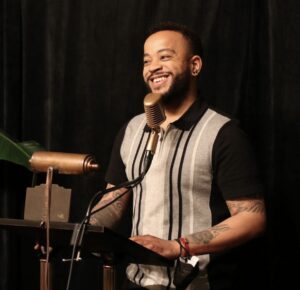From NCTE’s Standing Committee on Global Citizenship
This post was written by NCTE member Darius Phelps, who is also a member of the Standing Committee on Global Citizenship. As Committee members, we have discussed how we can amplify the importance of Culturally Relevant Pedagogy and teaching living poets. Poet, 2023 recipient of the NCTE Early Career Educator of Color Award, assistant director of programs under the Center for Publishing & Applied Liberal Arts (PALA) department at NYU, Darius amplifies this work with his blog post on how poetry can be used to “Embrace Every Hue.”
The National Council of Teachers of English (NCTE) has recently amplified the importance of creating space for both teachers and students to discuss complex societal issues. In the NCTE Position Statement on Supporting Teachers and Students in Discussing Complex Topics, the authors emphasize, “As educators, we not only have a responsibility toward our students to engage in societal dialogue; we also create space for students to develop their own sense of self, perspectives, opinions, and beliefs.” This guidance highlights a need for students to develop critical thinking and respectful discourse, which are essential in fostering informed citizens capable of engaging in nuanced discussions on identity, culture, and diversity.
As an educator and leader in English education, I strive to actualize these principles, using poetry as a tool for inquiry and dialogue. This approach, inspired by the works of poets like R.A. Villanueva, fosters critical reflection, empathy, and self-expression. Villanueva’s Reliquaria, with its intertextuality and exploration of memory, identity, and heritage, serves as a model for poetic inquiry, encouraging students to celebrate diverse voices and explore their identities through creative expression.
Celebrating Diversity through Poetry
My teaching philosophy, as a doctoral candidate at Teachers College, is rooted in the use of poetic inquiry, where poetry provides a canvas for students of all backgrounds to voice their unique experiences. R.A. Villanueva’s Reliquaria, for instance, integrates themes of cultural heritage and personal memory, presenting poetry as an exploration of the self and its relationship with history. Using this text in my undergraduate literature classes, as students delve into Villanueva’s work, they encounter a powerful representation of the Filipino American experience and are invited to consider their own cultural and familial narratives, cultivating an appreciation for varied perspectives (Villanueva 2014).
The practice of celebrating diverse voices in the classroom aligns with the ethos of “Embracing Every Hue” in Language Arts, encouraging students to recognize and appreciate the richness of human experience through poetry. This framework helps students see poetry as a means of understanding complex social issues, fostering empathy, and developing a respect for diversity (Phelps 2023).
Fostering Empathy and Connection
Villanueva’s poetry is deeply rooted in familial and cultural history, inviting readers to reflect on the shared human experience. Through the study of Reliquaria, students find a bridge to empathy and understanding as they witness the vulnerability and resilience expressed in Villanueva’s verses, emphasizing the role of poetry in fostering empathy. This act showcases the use of poetic dialogue as a way for students to embrace each other’s stories and create connections in the classroom. For students who navigate intersectional identities, poetry becomes an outlet to share and celebrate their unique “hues,” making the classroom a safe space for expressing one’s full identity (Phelps 2023).
Creating a Safe Space for Dialogue and Reflection
A central component of my pedagogical approach is fostering a safe environment where students feel comfortable exploring sensitive topics. In line with the values emphasized in “Embracing Every Hue,” collaborative poetry assignments encourage students to engage in discussions on diaspora, identity, and cultural heritage. Villanueva’s work opens pathways for students to reflect on personal and collective complexities, fostering dialogues that respect individual experiences and promote mutual understanding (NCTE 2024). Creating such “brave spaces” in classrooms allows students to deepen their self-awareness and build community through shared exploration.
Reflective writing is crucial for students to explore their identities, and Reliquaria offers a powerful example. Villanueva’s introspective work, drawing from his Filipino American background and cultural memories, invites students to analyze their own experiences and think critically about how their identities intersect with society. This reflection encourages students to deepen their understanding of self and community while fostering an environment where individual narratives are honored (Villanueva 2014).
Promoting Critical Thinking
The fragmented structure and intertextuality of Reliquaria challenge students to interpret layers of meaning, encouraging critical engagement with themes of culture, belonging, and identity. By analyzing Villanueva’s innovative poetic techniques, students not only appreciate the complexity of poetic expression but also develop their own critical thinking skills, preparing them for nuanced discussions about personal and societal beliefs (Villanueva 2014).
Embracing Multiple Perspectives through Multimodal Exploration
To reflect the diversity of human experience, it is essential to integrate various artistic forms in the classroom. The multimodal approach—combining written poetry, visual art, and performance—allows students to experiment with different mediums, enriching their creative and reflective experiences. This inclusivity mirrors the variety of voices in society, fostering a learning environment where students understand and appreciate multiple perspectives (Phelps 2023). To honor students’ voices, classroom anthologies document their poetic explorations, celebrating diverse narratives in a shared collection. Inspired by “Embracing Every Hue,” these anthologies serve as a testament to students’ engagement with complex topics, contributing to a collective archive of identity exploration. In creating these anthologies, students participate in a broader conversation about diversity, fostering a sense of community and shared inquiry (Phelps 2024).
By weaving together frameworks from the NCTE position statement, Villanueva’s Reliquaria, and pedagogical practices, poetry can serve as a transformative tool for classroom dialogue and identity exploration. Through poetic inquiry, students learn to engage in discussions on culture, empathy, and critical thought, becoming informed members of society capable of contributing to complex societal dialogues.
Ultimately, poetic inquiry not only enhances students’ literary skills but also empowers them to become thoughtful, empathetic, and engaged individuals—ready to navigate the intricacies of both personal and social identity; amplifying the power of using our narratives to create space for healing.
References
National Council of Teachers of English (NCTE). 2024. NCTE Position Statement on Supporting Teachers and Students in Discussing Complex Topics. NCTE.
Phelps, Darius. 2023. “Embracing Every Hue: Using Our Narratives to Cultivate Healing.” Language Arts 101 (1): 58–64.
Phelps, Darius. 2024. “Embracing Every Hue: Liberating Imposter Syndrome, Intersectionality, and Mental Health in Publishing.” NYU SPS Highlights.
Villanueva, R. A. 2014. Reliquaria. University of Nebraska Press.

Darius Phelps is a PhD candidate at Teachers College, Columbia University, and 2023 recipient of the NCTE Early Career Educator of Color Award. He is the assistant director of programs under the Center for Publishing & Applied Liberal Arts (PALA) department at NYU and is a manager at Brooklyn Poets. An educator, poet, spoken word artist, and activist, Darius writes poems about grief, liberation, emancipation, and reflection through the lens of a teacher of color and experiencing Black boy joy. His work and poems have appeared in the School Library Journal, NY English Record, NCTE’s English Journal, Pearl Press Magazine, ëëN Magazine, and many more. Recently, he was featured on WCBS and highlighted the importance of Black male educators in the classroom.
The Standing Committee on Global Citizenship works to identify and address issues of broad concern to NCTE members interested in promoting global citizenship and connections across global contexts within the Council and within members’ teaching contexts.
It is the policy of NCTE in all publications, including the Literacy & NCTE blog, to provide a forum for the open discussion of ideas concerning the content and the teaching of English and the language arts. Publicity accorded to any particular point of view does not imply endorsement by the Executive Committee, the Board of Directors, the staff, or the membership at large, except in announcements of policy, where such endorsement is clearly specified.

